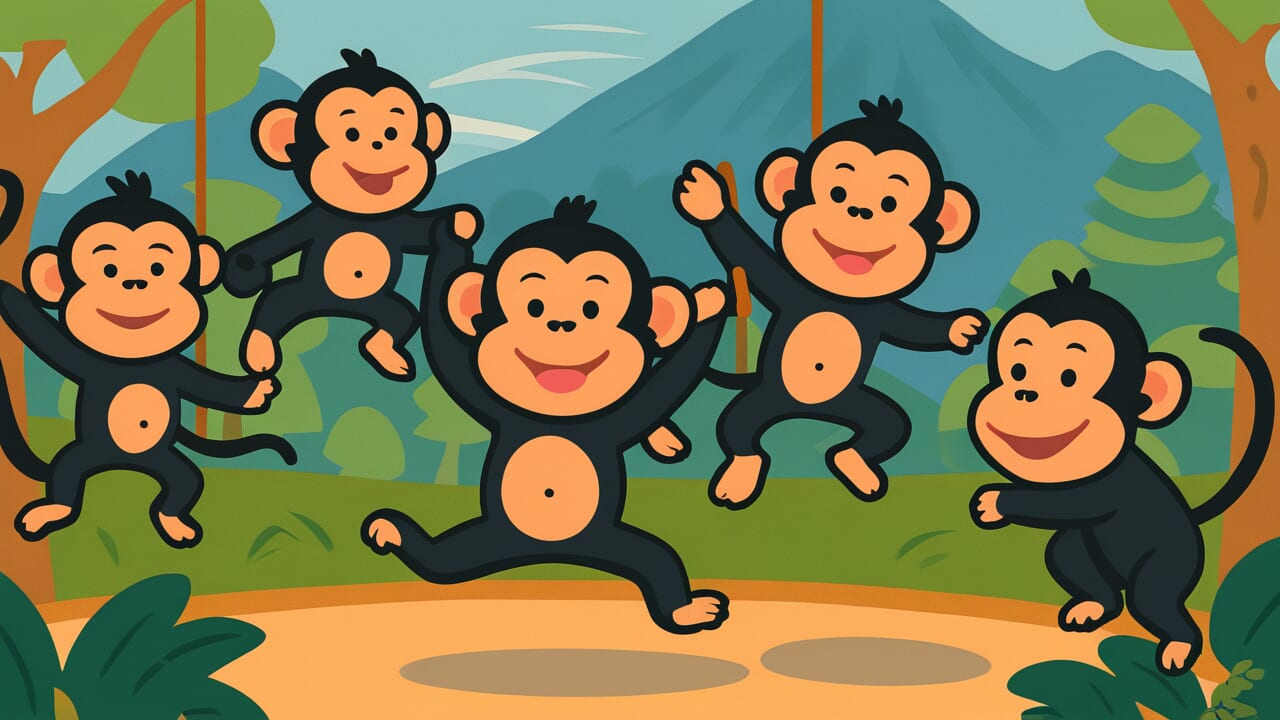How to Read “Every monkey will have his gambols”
Every monkey will have his gambols
[EV-ree MUN-kee will hav hiz GAM-bols]
“Gambols” means playful jumping or skipping around.
Meaning of “Every monkey will have his gambols”
Simply put, this proverb means that everyone will eventually let loose and have fun, no matter how serious they usually seem.
The literal words paint a picture of monkeys playing and jumping around. Monkeys are known for their playful nature and energetic movements. The word “gambols” refers to leaping, skipping, and frolicking in a carefree way. The proverb suggests that just like monkeys naturally play, all people have moments when they act silly or mischievous.
We use this saying when someone who is usually very serious suddenly acts playful or does something unexpected. It applies to the strict teacher who tells jokes on the last day of school. It fits the quiet coworker who suddenly starts dancing at the office party. Even the most responsible person will sometimes act spontaneous or do something just for fun.
What’s interesting about this wisdom is how it recognizes play as a basic human need. People often try to appear mature and controlled all the time. But this proverb reminds us that everyone has a playful side waiting to come out. It suggests that acting silly or having fun isn’t childish – it’s simply human nature.
Origin and Etymology
The exact origin of this proverb is unknown, though it appears to be several centuries old. Early versions can be found in English literature from past eras. The saying reflects a time when people closely observed animal behavior to understand human nature.
During earlier periods, monkeys were often used in entertainment and street performances. People watched these animals play and jump around with endless energy. This gave them a perfect comparison for human playfulness. The word “gambols” was more commonly used in everyday speech during these times.
The proverb spread through oral tradition and written works over many generations. Like many animal-based sayings, it traveled easily because everyone could understand the comparison. The image of playful monkeys made the message clear across different communities. Eventually, it became part of the common wisdom about human behavior and our need for fun.
Interesting Facts
The word “gambols” comes from an old French word meaning “to leap” or “to dance.” It’s related to the word “gambol” which specifically describes the bouncing, skipping movements that young animals make when they play. This type of movement was considered the perfect way to describe carefree, joyful behavior in both animals and humans.
Usage Examples
- Mother to father: “Let him stay up late on his birthday – every monkey will have his gambols.”
- Manager to colleague: “The new intern is being overly enthusiastic, but don’t worry – every monkey will have his gambols.”
Universal Wisdom
This proverb reveals a fundamental truth about human nature: play is not optional but essential. Throughout history, people have observed that even the most serious individuals eventually need moments of lightness and fun. This isn’t a character flaw or sign of immaturity – it’s a basic psychological requirement for mental health and social connection.
The wisdom recognizes that humans, like many social animals, use play to release tension and strengthen bonds with others. When we suppress our playful instincts too long, they eventually burst out in unexpected ways. The person who never jokes suddenly becomes the life of the party. The workaholic finally takes a silly vacation. These moments aren’t accidents – they’re necessary releases that help us maintain emotional balance.
What makes this observation timeless is how it challenges our ideas about maturity and responsibility. Society often pressures people to be serious and controlled at all times. But this proverb suggests that true wisdom includes knowing when to let go and have fun. It reminds us that playfulness and responsibility aren’t opposites – they’re both parts of a complete human experience. The healthiest people find ways to honor both their serious duties and their need for joy and spontaneity.
When AI Hears This
People naturally build up pressure from following rules and being serious. This pressure needs somewhere to go, like steam from a kettle. Even the most controlled person will eventually crack jokes or act silly. Their mind demands this release to stay balanced and healthy.
Society actually depends on these playful outbursts happening regularly. When someone finally lets loose, they prevent bigger problems later. Groups that never allow fun often explode in dangerous ways. Smart communities create safe spaces for people to be foolish occasionally.
What fascinates me is how humans perfectly time these releases. You somehow know exactly when pressure reaches dangerous levels. Then you instinctively do something playful to reset your mental state. This automatic system keeps both individuals and entire societies stable.
Lessons for Today
Understanding this wisdom helps us accept both our own need for play and others’ unexpected moments of silliness. When someone who is usually serious suddenly acts playful, we can recognize this as natural rather than surprising. This acceptance creates space for authentic relationships where people don’t have to maintain perfect composure all the time.
In our relationships with others, this proverb encourages patience and understanding. The strict parent who suddenly joins a water balloon fight isn’t being inconsistent – they’re being human. The serious friend who starts telling silly jokes isn’t losing their mind – they’re finding balance. Recognizing these moments as healthy expressions helps us support the people around us rather than judge their changes in behavior.
For communities and groups, this wisdom suggests the importance of creating safe spaces for play and spontaneity. Organizations that never allow for fun and lightness often find that playfulness emerges in less productive ways. But when groups intentionally make room for appropriate silliness and joy, people can express their full humanity while still accomplishing serious work. The key is understanding that play and productivity can coexist when we honor both as essential parts of human nature.



Comments